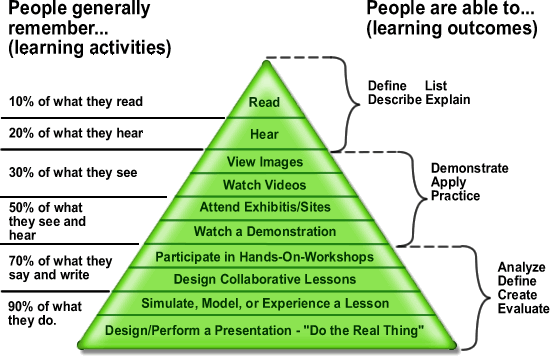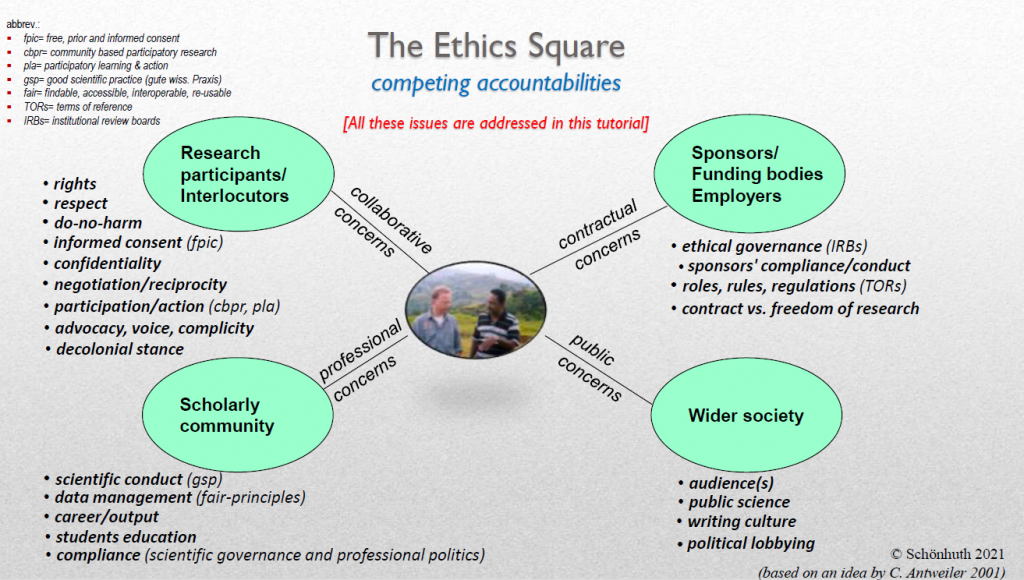I. Introduction
What’s in the package?
- For whom: This tutorial is intended as an information and sensitization tool for students or workshop organizers, acting as individuals or in teams, who need to deal with ethical questions within the framework of ethnographic research – be it as part of university courses, before, during or after fieldwork, or when applying for funds.
- Focus: Ethical questions arise regardless of the research location, due to a structural imbalance of power between researchers (who want to know) and those being researched (giving their knowledge). Such questions are nevertheless also dependent on the history of the respective academic discipline and the debates on ethics in scientific communities as well as within national and regional funding schemes.
- Bias: The tutorial therefore refers to fundamental questions of ethnographic research with examples from all over the world as well as, in some sections – due to the author’s geographical and disciplinary home base – to the specific constellations and current funding structures in Europe and to debates specific to social/cultural anthropology.
- The author: I work as a cultural anthropologist at the University of Trier, Germany (birth place of Karl Marx, located 10 km from the Luxembourg border). I have been teaching, researching and offering consulting services for more than 30 years now, at various places in the world.
- Motivation: Since 1989, when a group of young anthropologists was called upon to deal with ethical questions in order to be accepted as a working group within the German Anthropological Association (GAA), through the involvement in GAAs’ “Frankfurt Declaration of Ethics” in 2009, up to the co-development of guidelines and reflection papers for the members of the Association in 2019 I have been engaged with ethical questions in my discipline. -> See: https://en.dgska.de/ethics/)
- Download: Download the whole Ethics in Ethnographic Fieldwork-package in a PowerPoint presentation lay-out as .pdf file

Edgar Dale’s Cone of Learning. 14 April 2012. Author: Jeffrey Anderson. Wikimedia Commons
Forms of teaching/communication
Besides information and thought-provoking impulses from a wide range of selected sources the slides contain:
- Tips: references to documents or websites that are helpful for the clarification of ethical questions in the preparation of ethnographic field research or in the context of ethical review processes.
- Good reads: (annotated) references to selected literature for almost every topic addressed in the tutorial.
- Exercises: that you can do on your own or in buzz groups.
- Points to ponder: that should stimulate reflection on specific ethical issues, for yourself or in a group discussion.
- Citations: all italicized or colored parts in quotations in this tutorial were undertaken for didactic reasons.
- Copyright: You may use these slides for non-commercial, educational purposes within the framework of university courses, working groups or training events, provided the respective authorship is credited explicitly. Before using content, graphics or images of quoted sources, please clarify the copyright laws applicable in your country, or ask the authors for permission.

The Ethics Square © Schönhuth 2020 (see Chapter II)
Good read:
Lunn, Jenny. 2020 ed. Fieldwork in the global south. London: Routledge. Routledge studies in human geography. [The book brings together down-to-earth experiences of master’s and doctoral students in the field of development studies. Chapters cover: ethical challenges in the field; ethical dimensions of researcher identity; ethical issues related to research methods; and ethical dilemmas in dealing with a wide range of stakeholders.]
What awaits you (CONTENTS)
[Please click to jump to the corresponding chapter]
- I. Introduction: current page
- II. Positioning: defines the core of this tutorial as the core of ethnographic fieldwork: how our research design leaves us open to learning something unexpected; visualizes areas of tension in the midst of stakeholders, where you as an ethnographer have to constantly make decisions and weigh up different ethical accountabilities.
- III. Field Conduct: focuses on ethical concerns before, and during fieldwork, as well as in media settings (obligations towards, and informed consent of interlocutors, local norms of conduct, and conflicts that can arise when handling them).
- IV. Negotiation: deals with legitimate reciprocity claims by communities or interlocutors, but also with indecent reciprocity offers, the resulting dilemmas and negotiation options.
- V. Participation: focuses on both the benefits and the dilemmas that arise in trying to narrow the gap between researchers and those being researched through a participatory research design.
- VI. Representation: is dedicated to the question who writes whose stories (‘writing culture’) and looks at possible pitfalls in the publication process
- VII. Governance: gives examples of ethical review processes in use around the world; sheds light on the acute dangers for sound ethnographic practice posed by a new ethical governance of large funding institutions; presents alternative solutions.
- VIII. Compliance: deals with scientific conduct in the setting of domestic stakeholders (as funders or supervisors) & the compliance management of ethnographic research via ethical codes & guidelines.
- IX. Complexity: cuts all remaining ethical knots at the end of this tutorial with one sentence…

confused man, Wikimedia Commons
Good reads:
• Cassell, Joan. 1997. How to Hold a Workshop on Ethical Problems in Fieldwork. In: Handbook on Ethical Issues in Anthropology.
• von Unger, Hella (2016). Reflexivity beyond regulations: Teaching research ethics and qualitative methods in Germany. Qualitative Inquiry 22(2), 87-98. [shows, how research ethics can be taught as part of a curriculum for qualitative research through a learning-by-doing approach.
How to get the most out of this tutorial
- If you are a newcomer: start with chapter II. (Positioning) and continue up to chapter IV. (Negotiation). Then take advantage of those chapters and slides that you can connect most to.
- If you are interested in specific topics/terms across chapters: the easiest way is to use the search function (best with the pdf version) of the tutorial: “informed consent“, for instance, is covered in Chs. III, IV, and VII and in 11 entries in the bibliography…..
- if you use this tutorial for workshops: refrain from just reading off lots of these slides (in a teleprompter way), but develop your own slides by selecting smaller sets of contents suitable for your specific audience. Bring in your own field dilemmas, wherever possible [see the good reads on this page (Cassell 1997; von Unger 2016) for design options]
- if you use this tutorial for cooperative learning: have group members or sub-groups prepare topics using the respective ‘goodreads’, so that they can act as resource persons.
- If you have: convincing case studies, other solutions for ethical problems, know of smoother review processes and better data management plans, want to suggest further topics, draw attention to more in-depth literature, you have criticism or questions, please leave a comment in the commentary box at the end of each chapter (or do not hesitate to contact me), as this tutorial is a work in progress.
-> For personal comments – contact me at: anthropologist@mail.de

Author: haburnu with colors changed by Amousey/ CC0, Wikimedia Commons
Words of Gratitude
This presentation draws on many sources. All authors are explicitly thanked here. However, four key sources inspired this tutorial in particular
- AAA (American Anthropological Association). 2012. Principles of Professional Responsibility.
- ASA (Association of Social Anthropologists). 2011. Ethical Guidelines for Good Research Practice.’
- PERCS. 2018. The Ethics of Fieldwork Module. ELON University.
- Working Group Ethics Reviews (Arbeitskreis ‘Ethikbegutachtungen’) of the German Anthropological Association (GAA).
Thanks to all colleagues who provided feedback on previous versions.
A special thanks goes to Christoph Antweiler for his encouragement.

Einfach super informativ und anregend